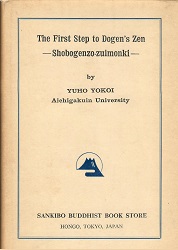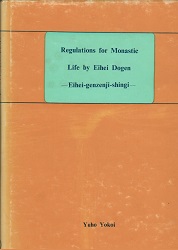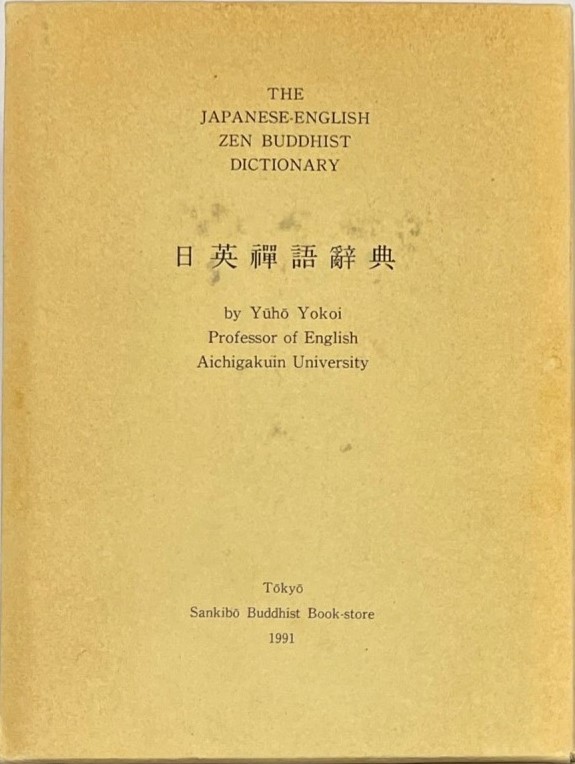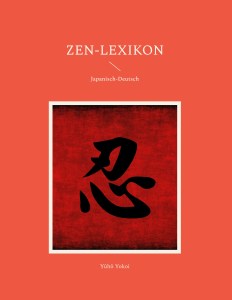ZEN IRODALOM ZEN LITERATURE
« Zen főoldal
« vissza a Terebess Online nyitólapjára
横井雄峯 Yokoi Yūhō (1918-200?)
Tartalom |
Contents |
Végh József: PDF: Dógen Zen mester magyarul elérhető írásai Hrabovszky Dóra: Fukan-zazen-gi A zazen dicsérete Az ülő meditáció szabályai (Sóbógenzó zazengi) A zazen ösvénye A szívében a megvilágosodás szellemével élő lény (bódhiszattva) négy irányadó tevékenysége Életünk kérdése (Gendzsókóan 現成公案) PDF: Az Út Gyakorlásában Követendő pontok |
真字正法眼蔵 [Mana/Shinji] Shōbōgenzō 仮字正法眼蔵 [Kana/Kaji] Shōbōgenzō 普勧坐禅儀 Fukan zazengi 学道用心集 Gakudō-yōjinshū Advice on Studying the Way 永平清規 Eihei shingi Eihei Rules of Purity 永平廣錄 Eihei kōroku Dōgen's Extensive Record 宝慶記 Hōkyō-ki Memoirs of the Hōkyō Period 傘松道詠 Sanshō dōei Verses on the Way from Sanshō Peak
孤雲懷奘 Kōun Ejō (1198-1280) 修證義 Shushō-gi, compiled in 1890 Kōshō-ji PDF: The Life of Dōgen Zenji |
Yūhō Yokoi was born in 1918 in Aichi Prefecture,
Japan. Educated at Komazawa and
Waseda universities, he is Associate Professor
of English at Aichi-gakuin University. He
entered the Soto Zen monkhood at the age
of twenty,
training at Sōji-ji, one of the sect's
two head temples. His master was the late
Eigan Kiyū* rōshi, chief monk of Tōyō-ji.
Mr. Yokoi has lectured on Zen Buddhism at the
Universities of California, Hawaii, and Pennsylvania.
*英岩(巖)希雄 A monk from the Muromachi (Muromachi Jidai, 1333-1573 CE) period. (The rōshi was named after him?)
PDF: Zen Master Dōgen: an introduction with selected writings
by Yūhō Yokoi, with the assistance of Daizen Victoria; and with a foreword by Minoru Kiyota
Weatherhill, 1976, 217 p.Contents
Foreword, by Minoru Kiyota 9
Preface, by Yuho Yokoi 12
Part One : Zen Master Dogen
1. Introduction 19
2. Japanese Buddhism before Dogen 22
3. Dogen's Life and Thought 27
Part Two : Independent Works
1. A Universal Recommendation for Zazen (Fukan Zazen-gi) 45
2. Points to Watch in Buddhist Training (Gakudo Yojin-shu) 48
3. The Meaning of Practice-Enlightenment (Shusho-gi) 58
Part Three: Twelve Sections of the Shobo-genzo
Introduction to the Shobo-genzo 67
1. The Merit of Becoming a Monk (Shukke Kudoku) 69
2. Receiving the Precepts (Jukai) 84
3. The Merit of a Kasaya (Kesa Kudoku) 88
4. Awakening to the Bodhi-mind (Hotsu Bodai-shin) 107
5. Veneration of the Buddhas (Kuyo Shobutsu) 113
6. Taking Refuge in the Three Treasures (Kie Bupposo-ho) 128
7. Deep Belief in Causality (Jinshin Inga) 136
8. Karmic Retribution in the Three Stages of Time (San-ji Go) 141
9. The Four Horses (Shi-me) 151
10. A Monk at the Fourth Stage of Meditation (Shi-zen Biku) 155
1 1. One Hundred and Eight Ways to Enlightenment (Ippyaku-hachi Homyo-mon) 168
12. The Eight Aspects of Enlightenment (Hachi Dainin-gaku) 175
Appendix A: Zazen Postures 178
Appendix B : Types of Kas aya 179
Notes 181
Glossary 199
From the Preface by Yūhō Yokoi
Having entered the Sōtō Zen monkhood at the age of twenty and trained
at Sōji-ji, one of the sect's two head monasteries, I realized that without an
understanding of Dōgen's Zen it is impossible to talk of Zen Buddhism in its
entirety. I therefore decided to embark on a lifelong effort to introduce to the
English-speaking world the life and unique thought of this Zen master as
recorded in his numerous works, particularly his masterwork, the Shobogenzo.In 1960 I began a detailed study of the Shōbō-genzō in preparation for its
translation. At the same time I also studied the grammatical structure of the
Japanese language of the Kamakura period (1185-1336) in order to grasp
more fully the linguistic meaning of the original and wrote a thesis concerning
my findings. It was not until 1965, however, that I actually began to
translate the Shobo-genzo into English as well as modern Japanese.Acting on the advice of senior colleagues, I decided first to publish in
English a minor work by Dōgen, the Shōbō-genzō Zuimonki, which consists of a
collection of Dōgen's discourses compiled by his leading disciple, Koun Ejō
(1198-1280). Because of its easy, literary style, this collection may be said to
form the gateway to the Soto sect in Japan. The Sankibo Buddhist Bookstore,
Tokyo, published my translation of this work in 1972,

The first step to Dōgen's Zen: Shōbō genzō zuimonki
Sankibō, 1972, 132 p.and in 1973 the same publisher issued my translation of Dōgen's Eihei Genzenji Shingi
(Regulations for Zen Monasteries). This work, composed of six sections, is a
detailed statement of the rules to be followed by Zen trainees during their
monastic life.

Regulations for monastic life = Eihei-genzenji-shingi
山喜房佛書林, Tōkyō: Sankibō Busshorin, Showa 48 [1973], 128 p.With the publication of the present book I have at last brought to at least
partial fruition my long-cherished desire to introduce the Shōbō-genzō to the
Western world. Rather than introduce the whole work, consisting of ninetytwo
sections in all, many parts of which are difficult even for advanced students
of Buddhism to understand, I have decided to introduce first its twelve
most readily understood, and in many ways most important, sections. At the
same time I have included three of Dōgen's important independent works:
"A Universal Recommendation for Zazen" (Fukan Zazen-gi), "Points to
Watch in Buddhist Training" (Gakudo Yōjin-shū), and "The Meaning of
Practice-Enlightenment" (Shushō-gi). These I believe will give the reader a
more comprehensive understanding of Dōgen's thought. It is my hope that
these translations, coupled with the short biography of Dōgen in the first
part of this book, will serve as an introduction to a man who is considered by
many Japanese to be one of the most profound, fecund, and deeply spiritual
products of Japanese Buddhism in its more than fourteen-hundred-year
history.
Other publications:
The Shōbō-genzō
[translated] by Yūhō Yokoi, Sankibō Buddhist Book-store 1986
英訳正法眼蔵 1-5
横井雄峯 著 山喜房佛書林 1986The Eihei-kōroku / Dōgen
Tr. by Yūhō Yokoi
Sankibō Buddhist Book-store, 1987, 377 p.
永平広録 現代語訳 〔道元/述〕 横井雄峯/訳
山喜房佛書林, 1993, 452 p.The Denkō-roku
by 螢山紹瑾 Keizan Jōkin (1268–1325)
[translation and preface] by Yūhō Yokoi
Sankibō Buddhist Book-store, 1993, 389 p.

日英禪語辭典 Nichi-Ei zengo jiten = The Japanese-English Zen Buddhist dictionary
by Yūhō Yokoi
Sankibō Buddhist Book-store, 1991, 856, 156 p.
易しい禅語五七五 (横井雄峯) 山喜房佛書林 2013. 69 p.
"Easy Zen words 575" Yasashii Zengo Goshichigo (by Yūhō Yokoi) Tōkyō: Sankibō Busshorin, 2013. 69 p.

Yûhô Yokoi: Zen-Lexikon Japanisch-Deutsch
Angkor Verlag, 2024. 724 Seiten.
https://books.google.hu/books/about/Zen_Lexikon.html?id=aGI0EQAAQBAJ&redir_esc=yYokoi Yûhô Rôshi wurde 1918 in der Präfektur Aichi geboren und mit zwanzig Jahren Sôtô-Mönch. Er übte im Soji-ji und studierte an der Komazawa- und Waseda-Universität. Später arbeitete als außerordentlicher Professor an der Aichi-gakuin-Universität und lehrte an verschiedenen US-Universitäten. Nach unserem Kontakt mit ihm (in einem Altersheim) und dem Beginn unserer Arbeit am Lexikon im Jahr 2011 verlor sich seine Spur, und auch die europäische Vertretung der Sôtô-Schule konnte uns nichts mehr über ihn mitteilen.
Der Autor wählte Begriffe aus folgenden Werken:
Yôgen Fukami: Zenshû-jiten (Wörterbuch der Zen-Schule), Nakayama-shobô 1965.
Zengaku-daijiten (Wörterbuch fürs Zen-Studium), Daishûkan-shoten 1978.
Yûhô Yokoi: Zen Master Dôgen, Weatherhill 1976.
Die Umschrift für Sanskrit wurde, wie im Angkor Verlag üblich, vereinfacht. Die Umschrift für chinesische Namen und Worte ist inzwischen veraltet, aber wir haben sie beibehalten, ebenso wie einige Eigenarten bei der Silbentrennung japanischer Worte, jedoch auf ein Glossar verzichtet. Wir glauben, dass das Lexikon im deutschen Sprachraum eher als Lesebuch zur Inspiration verwendet wird, da Studenten der Buddhologie und Japanologie auf die Originalquellen zurückgreifen können.
Insgesamt haben zwei Japanologen und eine Japanerin versucht, alle Schriftzeichen aus der Vorlage zu verifizieren. Einscannen war uns nicht möglich. In ein paar Fällen verweist Yokoi auf Einträge, die sich in der Vorlage nicht fanden. Seine Beispielsätze aus den Quellen geben nicht immer wörtlich die Einträge wieder.